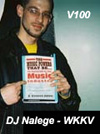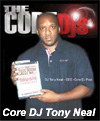GETTING RADIO PLAY
Getting
radio play for popular styles of music is perhaps one of the most challenging things to accomplish - especially for a new,
unknown artist. Now, I'm not talking about getting the support of college radio stations, Internet radio, and small market
AM stations. I'm talking about getting FM stations in medium to large populated areas to spin your record. It's almost as
if you have to be part of some perplexing, mystical, inside-hook-up, members-only, bring-lots-of-money-with-you fraternity
to even be considered for major radio stations to play your music. In fact, many times it's hard for major record labels to
get radio stations to play songs on well-known, established artists. And if you're a new label, all I can say is, "Having
a great song, a very good team, determination, creative marketing, and a lot of luck will definitely help you. Of course having
a truckload of money won't hurt either - but that's a different book (smile)." Outside of making sure radio stations have your song and promo materials, before you get too anxious
soliciting to the radio station's staff, you should really seek to get as much feedback as you can in the clubs and online.
Take advantage of using the web. Sites like Facebook, YouTube, and others are presently a great way to find out if people
genuinely like your music. As far as clubs go, especially if you are doing music that is dance oriented - clubs are a way
to get an instant response of how receptive your song is (or isn't). If your song can keep people dancing on the dance floor,
or is able to generate legitimate organic good responses on the web, then the song may have a good chance of being able to
compete with the other songs being played on radio as well. Of course, to get your song playing in the clubs, you will still
need to get the song to the club DJs. 
Now please don't think it's all that easy to get a popular club DJ
to play your record-just because he or she is a little more accessible than the radio station's DJ. Keep in mind, club DJs
get paid to keep the dance floor full. So the DJ is not going to like the idea of giving your song a spin, if you approach
them with some terrible song or awful music production. So make sure the song is "club- friendly" and mixed (and
mastered if needed) properly. What your track sounds like is definitely a big deal. I have experienced testing songs in clubs,
and have occasionally gotten a less-than-desirable response due to the song's mixing not being DJ mix-friendly with other
songs they were spinning. And of course, the timing of when a DJ plays your song will also come into play. If the DJ is mixing
a lot of House, Dance or Techno music with high tempo tracks, and you've got a mid-tempo R&B/Pop song, you might be asking
for a negative response. But if you do have a good song that works for the DJ's show, and they want to spin it-once you clearly
see them bouncing their head with excitement, make the next appropriate move - offer to buy him or her whatever they're drinking,
and give them a healthy tip ($) for helping you out. Another thing to keep in mind is that some club DJs are the same DJs
that work at the local radio stations. Next Step: Take it to the streets. Do freebies and promo handouts.
Actually, just do whatever it creatively takes to expose your song to the public and the market you are trying to reach...especially
the ones who listen to radio and request songs. You know the routine; make postcards, flyers, posters, T-Shirts, advertisements,
e-blasts, set up your YouTube, Facebook, Twitter, etc. You can also say on the promotional materials, "Call Your Radio
Station To Request It!" 
If you don't have some type of following from
doing live performances, or through sites like Facebook or YouTube, you should think about doing free promo shows in your
area and also utilizing the web for more exposure. Opening up for other artists on live shows that are sponsored by your local
radio and club promoters is a great way to get more exposure. During your shows, you can usually sell your music and other
merchandise, but its also a great idea to give a lot of music away for free at first, with instructions to your team (who
need be wearing your T-shirts) to persistently be reminding everyone to call the radio stations to request your song, and
maybe more importantly-visit you on your website and your social media pages to help your music and name spread virally. Giving
music away for free is a great strategy, and has worked for many superstar acts. The 1st song by the artist Ke$ha "Tik
Tok" was a freebie download in the beginning to create a viral buzz. Once the song spread virally on the web, the company
finally released the single on iTunes for sale, and it sold over 600,000 downloads in just the very first week in the USA.
See, if people really like a song, it starts to develop a "buzz" or "movement" and hopefully spreads across
different media outlets like social networks and with any luck, radio - where people call the station requesting to hear the
song, or request it online at the station's website. Once a station gets enough requests, the DJ may then go to the station's
Music Director about either breaking the song, or including it in one of his or her mixes. Actually, getting the song with
Mix-Show friendly stations and DJs is a great way to initially get a few spins. Also, always be on the lookout for specialty
shows at some of the radio stations that feature new music and artists. Note:
If you are putting records out on your own, do not approach the Program Director before approaching
the Music Director and DJs first. There is normally a chain of command in almost all
network soliciting. So start with the DJ - then the Music Director. They can then deal with the Program Director. |
Music Managers
10 Essential Music Business Contracts
|